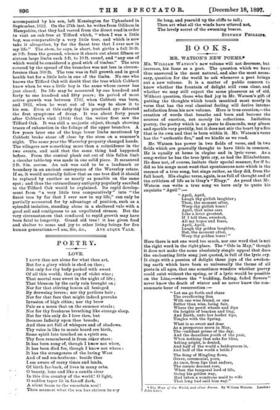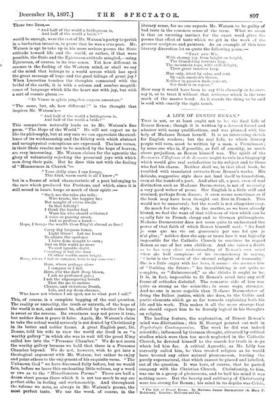BOOKS.
MR. WATSON'S NEW POEMS.* MR. WILLIAM WATSON'S new volume will not decrease, but increase, his fame as a poet. The question which we have
thus answered is the most natural, and also the most neces- sary, question for the world to ask whenever a poet brings out a new volume. It is a matter of public concern to know whether the fountain of delight still runs clear, and whether we may still expect the same pleasures as of old. Without question, those who find joy in Mr. Watson's gift of putting the thoughts which touch mankind most nearly in verse that has the real classical feeling will derive intense satisfaction from his new volume. Here is true creation,—the creation of words that breathe and burn and become the sources of emotion, not merely its reflections. Imitation poetry, the poetry which is as paste to diamonds, may gleam and sparkle very prettily, but it does not stir the heart by a fire that is its own and that is born within it. Mr. Watson's verse has the "authentic fire," and we kindle as we read.
Mr. Watson has power in two fields of verse, and in two fields which are generally thought to have little in common.
He is equally at home in elegiac and in lyric verse. As a song-writer he has the true lyric cry, as had the Elizabethans. He does not, of course, imitate their special manner, for if he did so his songs must want that spontaneous note which is the essence of a true song, but sings rather, as they did, from the full heart. His elegiac verse, again, is as full of thought and of the criticism of life as is Gray's "Elegy." As proof that Mr. Watson can write a true song we have only to quote hio exquisite "April" :—
" April, April,
Laugh thy girlish laughter ; Then, the moment after, Weep thy girlish tears ! April, that mine ears Like a lover greetest, If I tell thee, sweetest, All my hopes and fears, April, April, Laugh thy golden laughter, But, the moment after, Weep thy golden tears !"
Here there is not one word too much, nor one word that is not the right word in the right place. The "Ode in May," though it does not make the same absolutely simple appeal that does- the enchanting little song just quoted, is full of the lyric cry.
It sings with a passion of delight those joys of the awaken- ing earth which have been so universally the theme of all poets in all ages, that one sometimes wonders whether poetry could exist without the spring, or if a lyric would be possible on the Line,—where the "budding, fading, faded flowers"' never know the death of winter and so never know the con- summate hour of resurrection :—
"Let me go forth and share
The overflowing Sun With one wise friend, or one Better than wise, being fair, Where the pewit wheels and dips On heights of bracken and ling, And Earth, unto her leaflet tips, Tingles with the Spring.
What is so sweet and dear As a prosperous morn in May, The confident prime of the day, And the dauntless youth of the year, When nothing that asks for bliss, isking aright, is denied, And half of the world a bridegroom is, And half of the world a bride ?
The Song of Mingling flows, Grave, ceremonial, pure, As once, from lips that endure, The cosmic descant rose, When the temporal lord of life, Going his golden way, Bad taken a wondrous maid to wife That long had said him nay."
• The Hope of the WorLd, and other Poems. By W.tham Watson. London: John Lus'.
Those two lines,— " And half of the world a bridegroom is, And half of the world a bride ?"
would be enough, were the rest of Mr. Watson's poetry to perish in a barbarian invasion, to prove that he was a true poet. Mr.
Watson is apt to take up in his more serious poems the Stoic attitude toward life and the world, or rather, if that were possible, the Stoic and the Epicurean attitude mingled,—using
Epicurean, of course, in its true sense. Yet how different in essence is the feeling of the Western mind, or shall we say of the mind that belongs to a world across which has sped the great message of hope and the good tidings of great joy ? When Lucretius touches the thoughts connected with the bridal of the earth, it is with a solemn and sombre magnifi- cence of language which fills the heart not with joy, but with a sort of cosmic gloom :— " Et Venus in sylvis jungebat corpora a,mantum."
"The same, but, oh, how different !" is the thought that inspires Mr. Watson's-
" And half of the world a bridegroom is,
And half of the world a bride?"
This comparison naturally leads us to Mr. Watson's fine poem, "The Hope of the World." He will not expect us to like its philosophy, but at any rate we can appreciate the excel- lence of its workmanship and the felicity with which abstract and metaphysical conceptions are expressed. The last verses, in their Stoic resolve not to be mocked by the hope of heaven, are very interesting. Mr. Watson claims for the agnostic the glory of voluntarily rejecting the promised joys with which men drug their pain. But he does this not with the feeling of "Mimnermus in Church "—
" Your chilly stars I can forego,
This kind, warm earth is all I know ;" but in a frame of mind characteristic of a poet belonging to the race which produced the Puritans, and which, since it is still sound in heart, keeps so much of their spirit :—
"Such are the tales she tells :
Who trusts, the happier he : But nought of virtue dwells
In that felicity !
I think the harder feat Were his who should withstand A voice so passing sweet,
And so profuse a hand.— Hope, I forego the wealth thou fling'st abroad so free!
Carry thy largesse hence, Light Giver ! Let me learn To abjure the opulence
I have done nought to earn ;
And on this world no more To cast ignoble slight,
Counting it but the door
Of other worlds more bright.
Pro, where I fail or conquer, here is my concern:
_Here, where perhaps alone I conquer or I fail.
Here, o'er the dark Deep blown,
I ask no perfumed gale;
I ask the unpampering breath That fits me to endure Chance, and victorious Death, Life, and my doom obscure,
Who know not whence I am sped, nor to what port I sail."
This, of course, is a complete begging of the real question. The reality or unreality, the truth or untruth, of the hope of the world is not, and cannot be, affected by whether the hope is sweet or the reverse. Its sweetness may not prove it true, but neither does it prove it false. Again, Mr. Watson's claim to take the actual world seriously is not denied by Christianity in its better and nobler forms. A great English poet, Dr.
Donne, told his wife to view the world she lived in as "a worthy gallery" in which she was to wait till the great King called her into the "Presence Chamber." We do not scorn the worthy gallery because we hold that there is a Presence Chamber beyond. We do not, however, wish to get into a theological argument with Mr. Watson, but rather to enjoy and point others to the enjoyment of his exquisite verse. "The Unknown God" we have discussed fully before, but we would fain, before we leave this enchanting little volume, say a word or two as to the "Miscellaneous Poems." There are half a dozen short poems there which it is not too much to say are perfect alike in feeling and workmanship. And throughout the volume we note, as always in Mr. Watson's poems, the most perfect taste. We use the word, of course, in the literary sense, for no one expects Mr. Watson to be guilty of bad taste in the common sense of the term. What we mean is that an unerring instinct for the exact word gives his poems that effect of taste which we get in the work of the greatest sculptors and painters. As an example of this true literary discretion let us quote the following poem :—
"Tway AND WE.
With stormy joy, from height on height, The thundering torrents leap. The mountain tops, with still delight, Their great inaction keep.
Man only, irked by calm, and rent By each emotion's throes, Neither in passion finds content, Nor finds it in repose."
How easy it would have been to say this clumsily or to over- say it, or to treat it without that reticence which is the true mark of the master hand. As it stands the thing to be said is said with exactly the right touch.







































 Previous page
Previous page